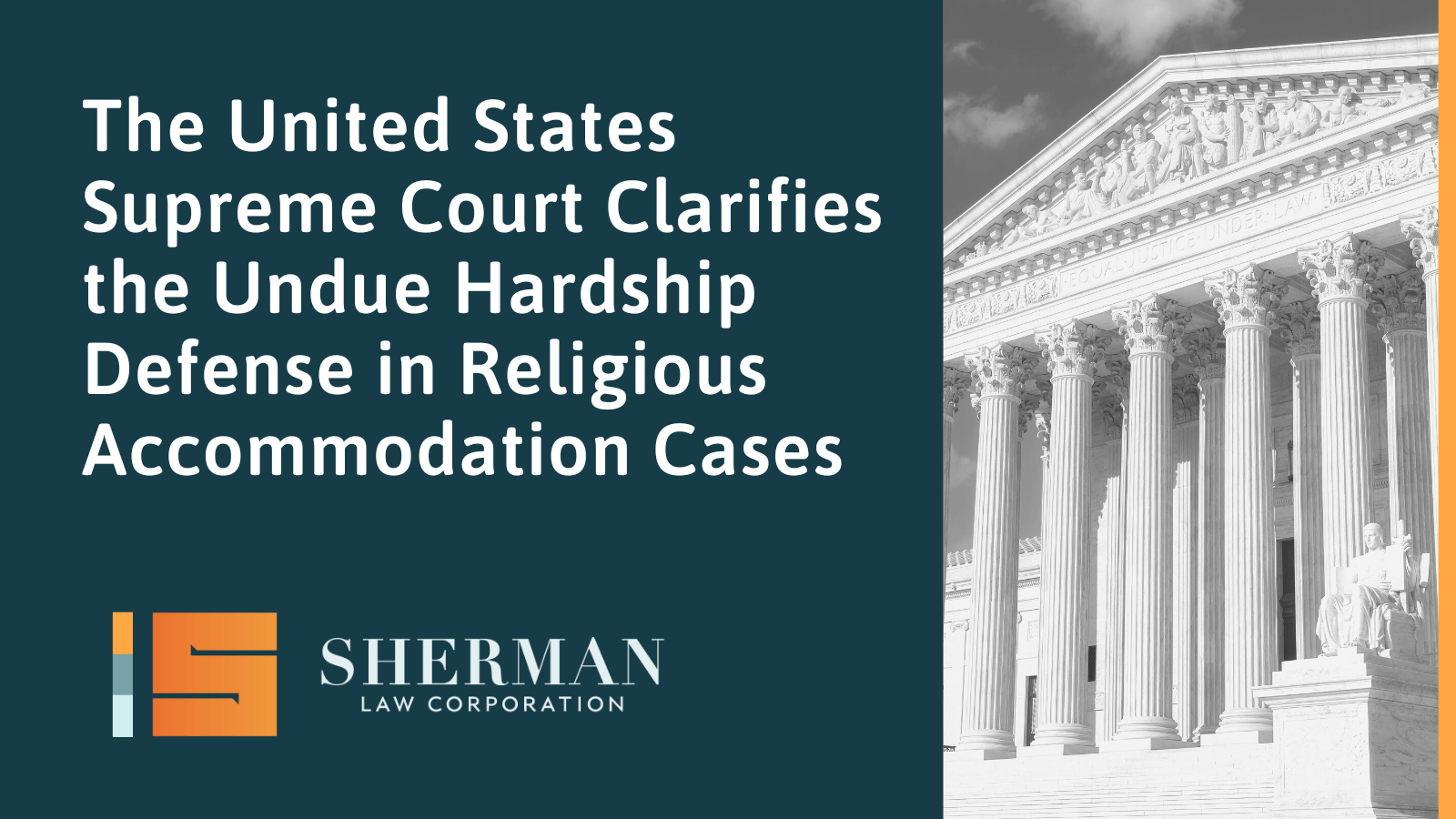
In its June 29, 2023 unanimous decision in Groff v. DeJoy, the United States Supreme Court upended nearly 50 years of precedent by “clarifying” the undue hardship defense in religious accommodation claims under Title VII of the Civil Rights Act of 1964, as amended.
In doing so, the Supreme Court effectively dismissed the “de minimis” framework and the precedent set in Trans World Airlines, Inc. v. Hardison, 432 U.S. 63 (1977), and created a new, and much higher, standard. The heightened standard requires employers assessing religious accommodations requests to deny such requests only if there is evidence that providing the accommodation would result in “substantial increased costs in relation to the conduct of [an employer’s] particular business.”
This is a much higher requirement for an employer assessing whether religious accommodation requests constitute an undue hardship on its business.
From experienced California employment attorney Lisa Sherman, here’s what employers in California and throughout the U.S. need to know about this ruling.
Groff v. DeJoy and Undue Hardship in Religious Accommodation Claims
By specifically declining to apply the “significant expense or difficulty” analysis and precedent established in cases decided under the Americans with Disabilities Act and conceding the application of the “clarifying” standard requires case-by case factual analysis in Groff v. DeJoy, the U.S. Supreme Court leaves employers without clear guidance on how to apply its new standard and creates significant uncertainty in the religious accommodations landscape.
In determining what would cause an “undue hardship” on the conduct of business, the Court provided little guidance, focusing its discussion on the importance of case-by-case analysis in such a way that courts “must apply the test in a manner that takes into account all relevant factors in the case at hand, including the particular accommodations at issue and their practical impact in light of the nature, “size and operating cost of [an] employer.”
The Court insists that this clarification will cause “little, if any, change in the [U.S. Equal Employment Opportunity Commission]’s guidance explaining why no undue hardship is imposed by temporary costs, voluntary shift swapping, occasional shift swapping, or administrative costs.”
Yet, the Court makes clear that it is not adopting the EEOC’s guidance by emphasizing that it would “not be prudent to ratify in toto a body of EEOC interpretation that has not had the benefit of the clarification [the Court] adopt[s] today.”
Where, pre-Groff, impacts on coworkers had more significance, the Supreme Court requires post-Groff, that employers demonstrate that any impact on other employees must directly relate to the “conduct of [its] business” and their analyses must “examin[e] whether that further logical step is shown in a particular case.”
In essence, the expectation is that employers assessing how religious accommodation claims impact other employees demonstrate, at a minimum, how other employees are impacted, how that impact affects the “conduct of its business,” and whether such impact constitutes a “substantial increased cost.” This approach is clearly more rigorous and heightened than the de minimis analysis.
In her concurrence, Justice Sotomayor (joined by Justice Jackson) observed that “[b]ecause the ‘conduct of [a] business’ plainly includes the management and performance of the business’s employees, undue hardship on the conduct of a business may include undue hardship on the business’s employees.”
Notably, this sentiment was not expressed in the majority’s opinion.
This new standard, including the more rigorous analysis that is now required when assessing the impact of religious accommodations requests on other employees, will clearly impact the religious accommodations landscape and make denial of religious accommodations requests more difficult. Further, determining what constitutes a “substantial increased cost” is currently undefined and will necessarily differ depending on an employer’s size, the nature and scope of its operations, etc.
This decision is likely to impose a greater obligation on larger employers because demonstrating “substantial increased cost” may be more difficult when there is a large workforce with talent presumably available to perform others’ work tasks and significant revenues or profits where the ability to bear the costs of accommodations are presumed.
Implication for Employers in California and Beyond
While the court states that its clarification of the undue hardship standard in the Groff decision will “prompt little, if any change in the [EEOC’s] guidance” regarding employers’ approach to religious accommodations, it is likely to bring an avalanche of religious accommodation requests.
To prepare for such circumstances, employers should begin considering:
- Re-educating and training managers, human resources professionals, recruiters and all involved with making religious accommodations decisions on this heightened standard and how best to apply it within the context of their unique businesses.
- Re-evaluating policies and procedures used when assessing religious accommodation requests.
- Applying more rigor to assessing religious accommodation requests by analyzing their impact on the “conduct of the business.” The analysis should include details about what the “substantial increased costs” are, including, but not limited to, how the business is impacted (which operations cannot run with a person absent, how a store may not open during business hours, how certain processes or work cannot be performed, lost revenues as a result, impact on customer expectations – failure to complete orders or increased customer complaints, impact on coverage for patients needing vital care, inability to meet certain regulatory requirements, etc.) and how other employees are impacted (i.e., inability to have adequate rest between shifts, inability to provide days off, increased errors, potential departures, etc.). These issues should be well documented and supported by workplace evidence.
- Considering – now – operational changes or modifications below the “substantial increased costs” threshold that could be offered as reasonable accommodation alternatives.
- Employing a practice of offering accommodation options – even if not the one the employee requests. This way, an employer demonstrates that it was not opposed or hostile to an employee’s religious accommodation request and may have mistakenly concluded a particular request would cause a “substantial increased cost.” At this juncture, until courts better define the contours of what constitutes “substantial increased costs” under this new standard, an employer may be in a better defensive posture to offer “something” as an option.
Contact Lisa Sherman Today
For more information on implementing the undue hardship defense, feel free to contact Sherman Law Corporation at (323)488-2087 or Lisa@sherm-law.com.




